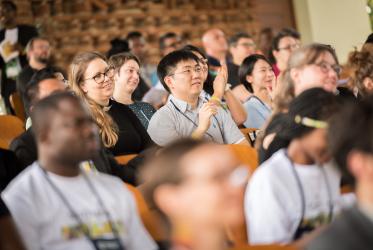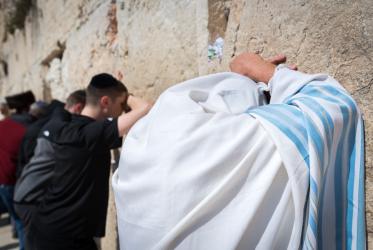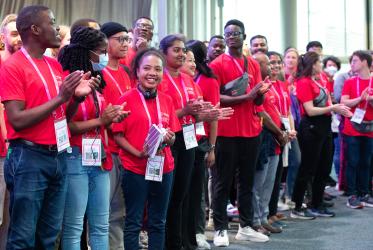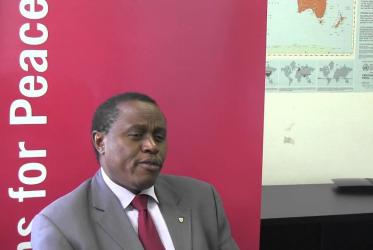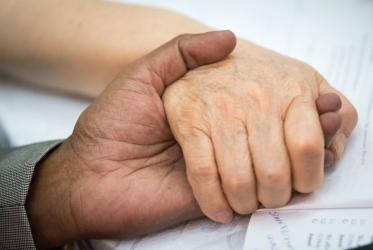The lecture, entitled “Serving Our Wounded World in Interreligious Solidarity: An Urgent Call for Us,” was delivered on 3 March to university leaders, students and scholars.
“I firmly believe that the wisdom and values of our religious traditions, singly and in solidarity, can play a critical role in healing our wounded world and saving and sustaining our one humanity,” he said.
The enormous task of protecting and aiding the world’s population continues to tax our health and economic systems, said Sauca. “This is the moment for all of us—in religious circles, in government, in the UN and civil society and in faith-based organizations such as the WCC—to step up and give our all to defeating the virus and ensuring the safety and health of people everywhere,” he said. “We pledge ourselves in solidarity to this campaign for life for all!”
Sauca outlined what the WCC has done, and is currently doing in response to pandemic and its aftermath.
"In the roughly two years since the pandemic started, the World Council of Churches has, while working remotely, reoriented its work to equip the world’s churches to address the healthcare and pastoral challenges posed by the pandemic and to minister in the presence of illness, death, and enormous disruption everywhere,” he said. “Given that staff travel and conferences were suddenly out of the question, much of the effectiveness of the WCC in this period stemmed from its rapid development of communications vehicles that could share stories from the wider fellowship, report on COVID-related initiatives, and highlight good practices among churches responding to COVID-19.”
He also mentioned prospects for further cooperation. “The pandemic has revealed or reinforced our shared vulnerability but also our fundamental community—indeed, our shared fate—as humans, our solidarity across divides and borders, and our capacity for empathy, understanding, and even heroic sacrifice,” he said.“Increasingly, too, we find that our shared faith commitment—however differently conceived—and shared values draw us to closer ties and collaboration with other religious traditions in cooperative work for climate justice, for religious freedom, and against human trafficking, for example.”
World Council of Churches acting general secretary Rev. Prof. Dr Ioan Sauca at conference with Ayatullah Reza Ramezani and Dr. Saeed Jazari.
Theology matters
But we do also need theological dialogue, Sauca said. “Theology matters – and I speak as a theologian myself,” he said. “What we believe and declare about God, and about human beings in relation to God and to each other – this matters, not just to Christians, but also to believers in all the different religious traditions.”
For dialogue to be possible, we need sustained and patient conversation, Sauca urged. “In our globalized situation, our work in interreligious dialogue and cooperation holds the prospect of a genuine fraternity among religious communities to address conflicts but also to prevent them, to make and keep peace but also to root it in the heart,” he said. “How can our encounters with each other deepen and purify our own faith?”
We cannot pretend that the path of interreligious dialogue and cooperation is an easy one, Sauca concluded. “Indeed, those who engage on behalf of their religious communities in interreligious work and reconciliation may face many challenges,” he said. “If they are to be authentic representatives, they must keep rooted in their own religious community, sensitive to its beliefs and historical perspectives, its concerns and its suffering.”
Sauca said he hoped to deepen interreligious collaboration. “May our interreligious bridge-building unite us in work for justice and peace, engender reconciliation among divided communities, and bring us ever closer to the divine love that creates and sustains all life, calling us to participate in the work of mending this beautiful but broken world,” he said.
The WCC delegation to Iran also included Rev. Dr Simone Sinn, academic dean at the Bossey Ecumenical Institute, as well as Dr Abraham Silo Wilar, WCC programme executive for Interreligious Dialogue.
Sinn, academic dean at the Bossey Ecumenical Institute, offered a presentation on “Improving human relations by recognising our shared humanity.”
“In a world that is marked by division, strife and suffering, we as people of faith are called to come together to interreligious dialogue to seek understanding, friendship and peace,” she said. “In this movement of dialogue we experience that recognising our shared humanity is of key importance.”
Recognition in the theological sense is not only an act of the mind, but of the heart, Sinn added. “We not only describe commonalities and differences between us, but we enter into an engaging relationship, recognising our shared humanity,” she said. “This is not just a rational operation, but a relational disposition towards the other.”
